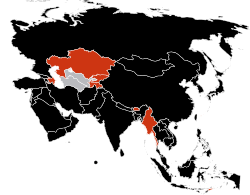2009 swine flu pandemic in Asia
The 2009 flu pandemic in Asia, part of an epidemic in 2009 of a new strain of influenza A virus subtype H1N1 causing what has been commonly called swine flu, afflicted at least 394,133 people in Asia with 2,137 confirmed deaths: there were 1,035 deaths confirmed in India, 737 deaths in China, 415 deaths in Turkey, 192 deaths in Thailand, and 170 deaths in South Korea. Among the Asian countries, South Korea had the most confirmed cases, followed by China, Hong Kong, and Thailand.
-
Cases of the A(H1N1) virus in Asia:DeathsConfirmed casesSuspected casesNo reported cases
-
Number of confirmed deaths of A(H1N1) virus in Asia:No deaths1+ deaths5+ deaths10+ deaths50+ deaths100+ deaths500+ deaths1000+ deaths5000+ deaths
-
Number of confirmed cases of A(H1N1) virus in Asia:50 000+ cases5 000+ cases500+ cases50+ cases5+ cases1+ cases
-
Community Outbreaks in Asia:Community Outbreaks
Azerbaijan
[edit]On 27 April 2009 Azerbaijan imposed a ban on import of animal husbandry products from the Americas. AZAL took additional safety measures and a sanitary quarantine unit of the Health Ministry started to operate in Heydar Aliyev International Airport with all aircraft and passengers being checked.
On 31 July, the first case of influenza A (H1N1) was confirmed.
Bahrain
[edit]In July, the Ministry of Health launched an awareness campaign ahead of the start of the academic year, with many fearing the reopening of schools would lead to a much greater outbreak of the flu.[11] By early August, 18 confirmed cases of the flu were reported.[12] Haj travel agencies reported that thousands of Bahraini pilgrims cancelled their trips to Mecca over fears of contracting swine flu.[13] Over 180 confirmed cases of the flu were reported in late August, all of whom had returned from traveling abroad.[13]
On 31 August, a 30-year-old Filipino housemaid died after contracting the H1N1 virus, becoming Bahrain's first confirmed death as a result of the virus.[14] On 3 September, it was reported that a 24-year-old Bahraini man died after succumbing to the H1N1 virus, being the first Bahraini to die of the disease.[15] On 8 September, it was announced that patients with flu-like symptoms would be treated with Tamiflu nationwide, regardless of having a fever or not. It was also announced that a million doses of the swine flu vaccine were ordered.[16] The Bahraini Ministry of Education had decided to postpone the opening of schools until October as a precaution, a decision that drew criticism from the World Health Organization.[17] In November 2009, the government stated that up to 1,346 cases of the H1N1 virus were confirmed in the country, along with 15,000 suspected cases of the virus.[18]
Bangladesh
[edit]As of 22 August 98 cases of the A (H1N1) virus were confirmed in Bangladesh.[19]
Burma (Myanmar)
[edit]On 1 May 2009 Chairman of Global Human Flu Prevention and Response Work Committee Deputy Minister for Health Dr Mya Oo inspected preventive measures against the human flu at Yangon International Airport, Burma (also known as Myanmar). On 27 June, Burmese state-run Radio Myanmar confirmed the first case of influenza A/H1N1 – a 13-year-old girl who just returned from a trip to Singapore.[20][21]
China
[edit]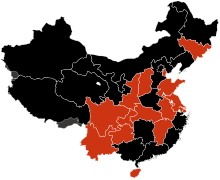
The first suspected case found on mainland China was reported on 11 May 2009.[22] As of 29 July 2009, the number of confirmed A/H1N1 cases on the Chinese mainland topped 2,000, with no deaths or serious cases reported, according to the Ministry of Health (MOH). Of the total 2,003 confirmed cases, 1,853 had recovered, said a statement on the MOH website.
The General Administration of Quality Supervision, Inspection and Quarantine (AQSIQ) of China issued an emergency notice on the evening of 26 April that visitors returning from flu-affected areas who experienced flu-like symptoms within two weeks would be quarantined.[23]
In early September 2009, China's State Food and Drug Administration granted approval to a homegrown swine flu vaccine, which producer Sinovac Biotech claimed to be effective after only one dose.[24][25]
On 4 January 2010, the Chinese Health Ministry announced that 659 deaths from swine flu have been recorded in 2009, with 120,940 confirmed detected cases throughout the year.[26]
Cyprus
[edit]Cyprus identified its first case of H1N1 on 30 May in a 39-year-old woman from Moldova, living in Cyprus, who returned from the United States on 28 May. As of 11 July 250 cases were confirmed in Cyprus.[27]
Hong Kong
[edit]


The Food and Health Bureau of Hong Kong[28] issued travel advice for Mexico on 26 April 2009, which advised Hong Kong residents not to travel to Mexico unless absolutely necessary. The first case reported was a Mexican who flew in from Shanghai. The Bureau also escalated the alert level from "alert" to "serious" on the same day,[29] which activated health protection measures in all ports of entry of Hong Kong. As such, temperature screening machines were used at all checkpoints to identify passengers with fever and respiratory symptoms. Any passenger who failed the temperature test and was confirmed as having a fever was quarantined and sent to public hospital for further investigation.[30] Hong Kong also became one of the first jurisdictions to declare swine flu as a notifiable disease, and much of the procedures against the spread of the swine flu were learned from the 2003 SARS outbreak, of which Hong Kong was the epicenter of the outbreak.[31][32]
The Secretary for Food and Health York Chow stated that special attention will be paid to passengers who came from countries where human infection of swine influenza cases were reported.[29]
On 1 May, one case became the first confirmed case of swine flu in Hong Kong and also the first in Asia after being tested positive by the University of Hong Kong and the Department of Health of Hong Kong. The Mexican patient, who travelled with two companions from Mexico to Hong Kong with a stopover in Shanghai Pudong Airport, arrived in Hong Kong on 30 April. Metropark Hotel Wanchai, where the patient stayed, was cordoned off by the police and health officials from the Centre for Health Protection.[33][34][35][36] All 350 guests and hotel staff had to remain inside the hotel for seven days. After the first swine flu case was confirmed by laboratory, Chief Executive Sir Donald Tsang raised Hong Kong's response level from "serious" to "emergency".[37]
As of 27 August 2009, there have been 10,468 confirmed cases of swine flu in the city.[38]
India
[edit]
The Government of India decided to screen all people entering India via the main airport hubs of Mumbai, New Delhi, Goa, Jaipur, Kochi, Kolkata, Chennai, Bangalore and Hyderabad, with the primary focus being passengers entering from the United States of America, United Kingdom, Canada, Mexico, France, and New Zealand. All in all, 50,000 people were affected by the virus, with 2,700 confirmed deaths.[39]
Indonesia
[edit]
After a coordination meeting about the flu on 27 April 2009, the Indonesian government halted the importation of pigs and initiated the examination of 9 million pigs in Indonesia.[40] Thermal scanners, which can detect human body temperature, were installed at Indonesian ports of entry. Temperatures above 38 degrees Celsius (100.4 Fahrenheit) cause the devices to beep, indicating fever.
As of 18 August 2009, one death was reported.

Over 4000 cases were confirmed in Israel, and over 60 people died.[41] In response to the outbreak, the Israeli Deputy Minister of Health, Yaakov Litzman, said that because swine are unclean, the outbreak needed to be renamed; and so in Israel, out of respect for the religious sensibilities of Muslims, it was called "Mexican Flu". This was done so as to not confuse the population into thinking that they could not acquire the virus if they did not eat pork.[42][43] The Israeli government retracted this proposal following Mexican complaints.[44]
Japan
[edit]
The Ministry of Agriculture, Forestry and Fisheries of Japan instructed animal quarantine offices across Japan to examine any live pigs being brought into Japan to make sure they were not infected with the influenza.[45] Japanese Agriculture Minister Shigeru Ishiba appeared on television to reassure customers that it was safe to eat pork.[46] The Japanese farm ministry said that it would not ask for restrictions on pork imports because the virus was unlikely to turn up in pork, and would be killed by cooking.[47]
On 8 May, the first three cases were confirmed. The infected patients had spent time in Oakville, Canada and returned to Japan via Detroit.[48][49] On 10 May, another case was confirmed from a student who came from a school trip to Canada, making it the fourth case in Japan.[50]
There have been 944 case confirmed in Japan as of 24 June 2009.[51]
On 2 July, the first case of oseltamivir-resistant virus in Asia was announced in Japan, in a woman who had been taking Tamiflu prophylactically.[52]
Kazakhstan
[edit]The first cases of A (H1N1) virus were discovered in 3 students from the capital Astana according to Natalia Buenko, an advisor to the Ministry of Health of Kazakhstan.[53]
Laos
[edit]
The Lao government agreed to buy 10 thermal imaging machines and install them at the country's major immigration border checkpoints. The machines would help officials identify anyone entering the country with a high temperature and create confidence among Laotians, foreigners living in Laos and people traveling to Laos. Health officials would be on hand at international border checkpoints to ensure anyone found to be infected could be treated immediately. Each machine could cost about US$25,000. The decision to buy them was made after the government found visitors to Laos included people coming from the United States, Spain and other affected countries.
The Prime Minister Bouasone Bouphavanh said masks should be made available and health officials would be assigned to work at border checkpoints. Health officials would be on hand at international border checkpoints to ensure anyone found to be infected could be treated immediately. On 18 June, the first case in Laos was confirmed. [54]
Lebanon
[edit]A Lebanese man suffering from a serious illness died from the H1N1 swine flu strain on Thursday 30 July 2009, which makes the first death in Lebanon, Health Minister Mohammad Khalifeh told Reuters. The 30-year-old victim had been receiving treatment for leukemia when he contracted the virus, possibly from relatives who had just traveled from Australia to Lebanon, the minister said. Lebanon has recorded more than 100 cases of H1N1.[55]
Malaysia
[edit]
Malaysia detected the first case of influenza A(H1N1) on 15 May 2009 in a 21-year-old student who returned from the United States.[56] As of 11 August 2009 there were 2,253 confirmed cases in Malaysia.[57] The Health Ministry announced that from 12 August 2009 they had discontinued the counting of the total number of H1N1 cases in line with guidelines issued by the World Health Organization.[58]
Maldives
[edit]The first death from H1N1 flu virus was confirmed on 19 November.[59]
Mongolia
[edit]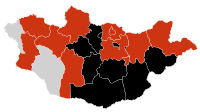
The Mongolian Health Ministry sought to prevent the spread of swine flu in Mongolia by urging people to avoid public places.[60]
As of 22 October 126 cases were confirmed in Mongolia. Just after seven days, the number increased to 394 with five deaths.
North Korea
[edit]
Most defectors with backgrounds in health care agree that, considering the isolation of North Korean society and its highly inadequate health care system, incidents of swine flu are likely to be either suppressed or merely misdiagnosed.
Following the confirmation of the first case of the disease in Mongolia, heightened concerns arose.
On 16 November, the first known case was confirmed by the Ministry of Unification, released in a report by Korea Times. The first case was confirmed in a South Korean worker in Gaeseong Industrial Complex.[61]
Oman
[edit]As of 13 August 2009, 337 cases have been confirmed by the National Pandemic Influenza Committee in Oman.
Pakistan
[edit]There were 90 confirmed cases as of 26 January 2010.[62]
Philippines
[edit]
Health Secretary Francisco T. Duque III ordered the Bureau of Quarantine to use thermal imaging equipment at airports to screen passengers coming from the US for flu symptoms.[63][64] The Philippines may quarantine travelers arriving from Mexico with fevers.[65] Also, the Secretary of the Department of Agriculture issued an order banning the importation of hogs from the U.S. and Mexico, and the retraction of the restriction of swine influenza vaccine use.[66] The medical alert phase is already Code White, the lowest.[67]
On 18 May 2009, a Filipina girl who arrived from Houston, Texas, United States was the first confirmed case of H1N1 virus in the Philippines.
The highest confirmed in one day was on 24 June 2009 with 131 cases.[68] The next day, the confirmed cases added was 123. Because of that, the Department of Health ordered the people that should get swab tests are the only people with very complicated cases (e.g. with lung disorders, hearth disorders, babies etc.). The government said that the very fast spreading of the disease was caused by the population density of the country.
Russia
[edit]Saudi Arabia
[edit]By 17 August, there have been about 2,000 cases of the flu, resulting in 14 deaths.
Singapore
[edit]On 30 April 2009, the Singapore Ministry of Health raised its Disease Outbreak Response System to "Alert Orange". The first case of the H1N1 virus in Singapore was confirmed on 27 May 2009, in which a then 22-year-old woman picked up the virus after visiting New York City, United States.[69] As of 7 July 2009, there were 1,217 confirmed cases.[70] As of 17 October 2009, there were 18 confirmed deaths from the H1N1 virus in Singapore.[71] On 12 February 2010, the Singapore Ministry of Health moved its alert level to Green.[72]
Sri Lanka
[edit]The first case of Influenza A (H1N1-2009) was confirmed on 16 June 2009 in Sri Lanka.
South Korea
[edit]On 28 April, South Korea reported its first probable case of swine flu after positive preliminary tests on a nun who had recently returned from a trip to Mexico.[73] South Korea became the third infected nation in Asia, after Israel and Hong Kong. On 15 August, the first Korean death by the new influenza was confirmed and a second death was announced on 16 August. Around late November 2009, there was a double cases from the US. Around 15000 cases and 14 deaths have been reported as of 12 October 2009.
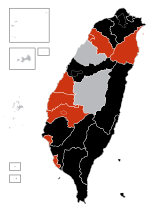
On 20 May 2009, the first case of the influenza was confirmed in Taiwan.[74]
There were 5,474 confirmed cases of H1N1 in Taiwan.[75]
Thailand
[edit]
Turkey
[edit]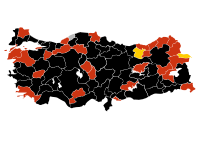
The first case of A(H1N1) in Turkey was reported on 16 May 2009.[76] A U.S. citizen, flying from the United States via Amsterdam was found to be suffering from the swine flu after arriving Istanbul's Atatürk International Airport.[77] Turkey is the 36th country in the world to report an incident of swine flu. The Turkish Government has taken measures at the international airports, using thermal imaging cameras to check passengers coming from international destinations.[78] As of 11 August, there were 312 confirmed cases in Turkey.[79] As of 24 October, there is 1 confirmed death in Turkey. It is reported by Ministry of Health that one person died in Ankara. In addition, there are 958 confirmed cases in Turkey.[80]
Vietnam
[edit]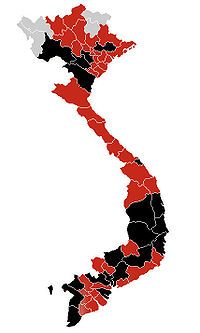
On 31 May 2009, The government of Vietnam announced its first case of A (H1N1) virus in the country.
Yemen
[edit]As of 4 July 2009 there have been reported 7 cases of A(H1N1) flu in Yemen.[81]
Timeline
[edit]Top 5 countries
[edit]| Top 5 cases | Top 5 deaths |
|---|---|
References
[edit]- ^ a b c d e f g h i j k l m n o p q r s t u v w x y z aa ab ac ad ae af ag ah ai aj ak "ECDC Daily Update" (PDF). European Centre for Disease Prevention and Control. 8 January 2010. Archived from the original (PDF) on 20 February 2010. Retrieved 8 January 2010.
- ^ "Consolidated Status of Influenza A H1N1 as on 26th November 2009 (PIB 26-11-2009 )". PIB Press Release. 25 November 2009. Archived from the original on 14 February 2010. Retrieved 26 November 2009.
- ^ a b c d e f g h i j k l m n o p q r s t u v w x y z aa ab ac ad ae af ag ah ai aj ak al am an ao ap aq ar as "Swine Flu Count - Worldwide statistics of the H1N1 Influenza A Pandemic". flucount.org. 13 November 2009. Archived from the original on 2 October 2009. Retrieved 13 November 2009.
- ^ Breaking News, AFP (4 January 2010). "China records 659 flu deaths". Agence France-Presse. The Straits Times. Archived from the original on 8 January 2010. Retrieved 9 January 2010.
- ^ "Pandemic H1N1 2009 - Thailand". WHO SEARO. 14 November 2009. Archived from the original on 12 August 2009. Retrieved 25 November 2009.
- ^ "Iran has 3,672 swine flu cases: health minister". Zawya. 25 November 2009. Archived from the original on 10 August 2011. Retrieved 25 November 2009.
- ^ a b c "Pandemic (H1N1) 2009". WHO EMRO. 21 November 2009. Archived from the original on 26 November 2009. Retrieved 25 November 2009.
- ^ Daily "Swine and Seasonal Flu Monitor - Volume 1, Number 9" (PDF). Surveillance and Epidemiology Branch, Centre for Health Protection. 18 November 2009. Archived (PDF) from the original on 4 March 2021. Retrieved 19 November 2009.
- ^ "Georgia reports 120 cases of swine flu". Trend. 23 November 2009. Archived from the original on 26 November 2009. Retrieved 25 November 2009.
- ^ "H5N1: North Korea's first H1N1 case is a South Korean". Archived from the original on 4 December 2009. Retrieved 9 December 2009.
- ^ "'Swine flu' alert as schools close for summer". Gulf Weekly. 12 July 2009. Archived from the original on 17 May 2013. Retrieved 1 September 2012.
- ^ "Swine flu fight is on". Gulf Weekly. 9 August 2009. Archived from the original on 17 May 2013. Retrieved 1 September 2012.
- ^ a b "Flu scare hits Umrah trips from Bahrain". TradeArabia. 23 August 2009. Archived from the original on 17 May 2013. Retrieved 1 September 2012.
- ^ "Bahrain reports first swine flu death". TradeArabia. 31 August 2009. Archived from the original on 17 May 2013. Retrieved 1 September 2012.
- ^ "Second flu death in Bahrain". Trade Arabia. 3 September 2009. Archived from the original on 17 May 2013. Retrieved 1 September 2012.
- ^ "Bahrain to treat all flu patients with Tamiflu". TradeArabia. 8 September 2009. Archived from the original on 17 May 2013. Retrieved 1 September 2012.
- ^ "WHO raps Bahrain schools delay". TradeArabia. 9 September 2009. Archived from the original on 17 May 2013. Retrieved 1 September 2012.
- ^ "Flu cases top 1,346 in Bahrain". TradeArabia. Archived from the original on 17 May 2013. Retrieved 1 September 2012.
- ^ "Number of A/H1N1 flu cases up to 98 in Bangladesh_English_Xinhua". Archived from the original on 28 August 2009. Retrieved 22 August 2009.
- ^ "Myanmar reports first A/H1N1 flu". The People's Daily. 28 June 2009. Archived from the original on 5 August 2011. Retrieved 22 October 2009.
- ^ "Myanmar Confirms First H1N1 Case". Wall Street Journal. 27 June 2009. Archived from the original on 1 July 2009. Retrieved 22 October 2009.
- ^ Branigan, Tania (11 May 2009). "China confirms first swine flu case". the Guardian. Retrieved 14 July 2024.
- ^ "FACTBOX-Asia moves to ward off new flu virus". Reuters. 9 February 2009. Archived from the original on 30 April 2009. Retrieved 26 April 2009.
- ^ "China's Sinovac gets world's first production license for A/H1N1 flu vaccine". Xinhua. Archived from the original on 12 August 2011. Retrieved 8 September 2009.
- ^ "(The Sydney Morning Herald)". 3 September 2009. Archived from the original on 6 September 2009. Retrieved 8 September 2009.
- ^ Breaking News, AFP (4 January 2010). "China records 659 flu deaths". The Straits Times. Archived from the original on 8 January 2010. Retrieved 9 January 2010.
- ^ "Outbreak of influenza A(H1N1) virus". European Centre for Disease Prevention and Control. Archived from the original on 16 July 2009.
- ^ "Latest News of Center for Health Protection |publisher=Centre for Health Protection, Hong Kong". Chp.gov.hk. Retrieved 2 May 2009.[permanent dead link]
- ^ a b "Swine flu alert raised to 'serious'". Sc.info.gov.hk. 26 April 2009. Archived from the original on 29 April 2009. Retrieved 2 May 2009.
- ^ "Secretary for Food and Health on the issue of swine flu (press releases)". Fhb.gov.hk. 26 April 2009. Archived from the original on 30 April 2009. Retrieved 2 May 2009.
- ^ Tang, Leslie (28 April 2009). "HK steps up SARS-like emergency precautions against swine flu". Channel News Asia. Archived from the original on 2 December 2012. Retrieved 29 April 2009.
- ^ Webley, Kayla (27 April 2009). "The Lessons from SARS". Time. Archived from the original on 30 April 2009. Retrieved 29 April 2009.
- ^ "Emergency in force after case confirmed". Radio Television Hong Kong. 1 May 2009. Archived from the original on 3 May 2009. Retrieved 1 May 2009.
- ^ "Hong Kong govt confirms first H1N1 flu case". Reuters. 1 May 2009. Archived from the original on 3 May 2009. Retrieved 1 May 2009.
- ^ "Hong Kong Confirms Swine Flu Case, Declares Emergency". Bloomberg. 1 May 2009. Retrieved 1 May 2009.
- ^ "SFH on human swine flu press conference on 1/5". Centre for Health Protection, Hong Kong. 1 May 2009. Retrieved 22 October 2009.
- ^ "1st H1N1 case confirmed in HK". News.gov.hk. Archived from the original on 4 June 2009. Retrieved 2 May 2009.
- ^ "Update on Human Swine Influenza" (PDF). Centre for Health Protection. 14 June 2009. Archived from the original (PDF) on 7 August 2009. Retrieved 27 August 2009.
- ^ "India swine flu deaths rise above 1,000". 24 August 2017. Archived from the original on 18 December 2019. Retrieved 1 January 2020.
- ^ "Cegah flu babi, pemerintah gelar rapat koordinasi". Kompas newspaper. 27 April 2009. Archived from the original on 1 May 2009. Retrieved 22 October 2009.
- ^ "76-year-old man dies of swine flu". Ynetnews. 2009. Archived from the original on 1 July 2024. Retrieved 2 December 2009.
- ^ BBC News, "Israel renames unkosher swine flu" Archived 30 April 2009 at the Wayback Machine, 27 April 2009 . Retrieved 28 April 2009.
- ^ Yahoo News, "Israeli official: Swine flu name offensive" Archived 2 May 2009 at the Wayback Machine, Associated Press, 27 April 2009 . Retrieved 28 April 2009.
- ^ Pilkington, Ed (28 April 2009). "What's in a name? Governments debate 'swine flu' versus 'Mexican flu' | World news |". The Guardian. London. Archived from the original on 1 May 2009. Retrieved 30 April 2009.
- ^ "Japan on high alert for swine flu after outbreak in Mexico". Kyodo News. 26 April 2009. Archived from the original on 29 April 2009. Retrieved 26 April 2009.
- ^ MOFA issues red travel alert for Mexico on swine fluu. CNA Archived 29 April 2009 at the Wayback Machine
- ^ "FACTBOX-Asia moves to ward off new flu virus". Reuters. 26 April 2009. Archived from the original on 30 April 2009. Retrieved 22 October 2009.
- ^ "Japáo confirma primeiros três casos de gripe H1N1" (in Portuguese). O Globo. 8 May 2009. Archived from the original on 15 June 2011. Retrieved 8 May 2009.
- ^ Kubota, Yoko (8 May 2009). "Japan confirms 3 cases of new flu strain". Reuters. Archived from the original on 15 May 2009. Retrieved 9 May 2009.
- ^ "NHK- Japan Confirms 4th Case of Swine Flu". Pacific News Center. 10 May 2009. Archived from the original on 15 July 2009. Retrieved 10 May 2009.
- ^ "Patients of A/H1N1 flu amount to 410 in Japan". Xinhua. 4 June 2009. Archived from the original on 9 August 2011. Retrieved 4 June 2009.
- ^ Reuters, "Japan finds first case of H1N1 resistant to Tamiflu" Archived 22 November 2020 at the Wayback Machine, Yoko Kubota, 2 July 2009
- ^ "Three students diagnosed with А/Н1N1 in Astana". Kazakhstan Today. 23 June 2009. Archived from the original on 22 July 2011. Retrieved 22 October 2009.
- ^ "Govt to make swine flu border checks". Vientiane Times. Archived from the original on 2 May 2009. Retrieved 29 April 2009.
- ^ "Lebanon records first H1N1 death". Reuters. 30 July 2009. Archived from the original on 2 August 2009. Retrieved 30 July 2009.
- ^ "Malaysia confirms first case of A(H1N1) flu (Update 2)". TheStar Online. 15 May 2009. Archived from the original on 19 May 2009. Retrieved 22 October 2009.
- ^ "6 new flu deaths in M'sia". Straits Times. 11 August 2009. Archived from the original on 14 August 2009. Retrieved 22 October 2009.
- ^ "Influenza A(H1N1): Death toll now 68". Malaysia Ministry of Health. 20 August 2009. Archived from the original on 27 July 2009. Retrieved 22 October 2009.
- ^ "Maldives confirms first H1N1 flu death". Reuters. 19 November 2009. Retrieved 3 July 2024.
- ^ "Mongolia quarantines air passengers following swine flu alert | Mongolia Web News". Archived from the original on 17 November 2009. Retrieved 6 October 2009.
- ^ "H5N1: North Korea's first H1N1 case is a South Korean". Archived from the original on 4 December 2009. Retrieved 9 December 2009.
- ^ Four new H1N1 cases confirmed in Karachi – GEO.tv Archived 23 September 2011 at the Wayback Machine
- ^ "Quarantine screening of US passengers ordered | Manila Bulletin". Mb.com.ph. Archived from the original on 29 April 2009. Retrieved 26 April 2009.
- ^ The Philippines' may quarantine travelers Archived 29 August 2012 at the Wayback Machine with Swine flu Symptoms
- ^ Frank Jordans (25 April 2009). "WHO declares international concern over swine flu". Associated Press. Archived from the original on 11 December 2018. Retrieved 22 October 2009.
- ^ "RP bans pork, hogs from US, Mexico". ABS-CBN. 26 April 2009. Archived from the original on 27 April 2009. Retrieved 26 April 2009.
- ^ "Philippines on high alert against swine flu". news.xinhuanet.com. Archived from the original on 2 May 2009. Retrieved 1 May 2009.
- ^ "131 new H1N1 cases, total up to 604". Archived from the original on 1 August 2016. Retrieved 21 February 2021.
- ^ "Singapore records first A (H1N1) flu case". The Star. 27 May 2009. Archived from the original on 7 September 2012. Retrieved 2 November 2012.
- ^ "Singapore confirms 23 new flu A/ H1N1 cases". xinhua. 21 June 2009. Archived from the original on 23 June 2009. Retrieved 8 September 2009.
- ^ "Singapore reports two more A/H1N1 related deaths". xinhua. 22 June 2009. Archived from the original on 30 August 2009. Retrieved 8 September 2009.
- ^ "Reverting to Green Alert Status for Influenza A (H1N1) pandemic". Ministry of Health (Singapore). 12 February 2010. Archived from the original on 17 February 2020. Retrieved 17 February 2020.
- ^ SKorean woman 'probably' has swine flu: health agency. From Asiaone Archived 1 May 2009 at the Wayback Machine, 28 April 2009.
- ^ Taiwan issues phase 2 warning after 1st swine flu case confirmed Archived 21 May 2009 at the Wayback Machine. The China Post
- ^ Taiwan to launch on-board flu checks on flights from America. CNA Archived 24 July 2009 at the Wayback Machine
- ^ "Swine flu arrives in Turkey: 6 tourists in quarantine". eturbonews.com. 17 May 2009. Archived from the original on 10 July 2011. Retrieved 20 May 2009.
- ^ "First case of swine flu confirmed in Turkey". turkishny.com. 16 May 2009. Archived from the original on 19 May 2009. Retrieved 13 June 2009.
- ^ "Alarmed by swine flu, Turkey takes immediate action". Todayszaman.com. 28 April 2009. Archived from the original on 7 May 2009. Retrieved 20 May 2009.
- ^ Türkiye Cumhuriyeti Sağlık Bakanlığı (Ministry of Health)
- ^ NTVMSNBC http://www.ntvmsnbc.com/id/25014042/ Archived 27 October 2009 at the Wayback Machine
- ^ "Health Ministry announces the country's 7th case of swine flu". Yemen Observer. Archived from the original on 9 February 2013. Retrieved 4 July 2009.
{{cite web}}: CS1 maint: unfit URL (link)

